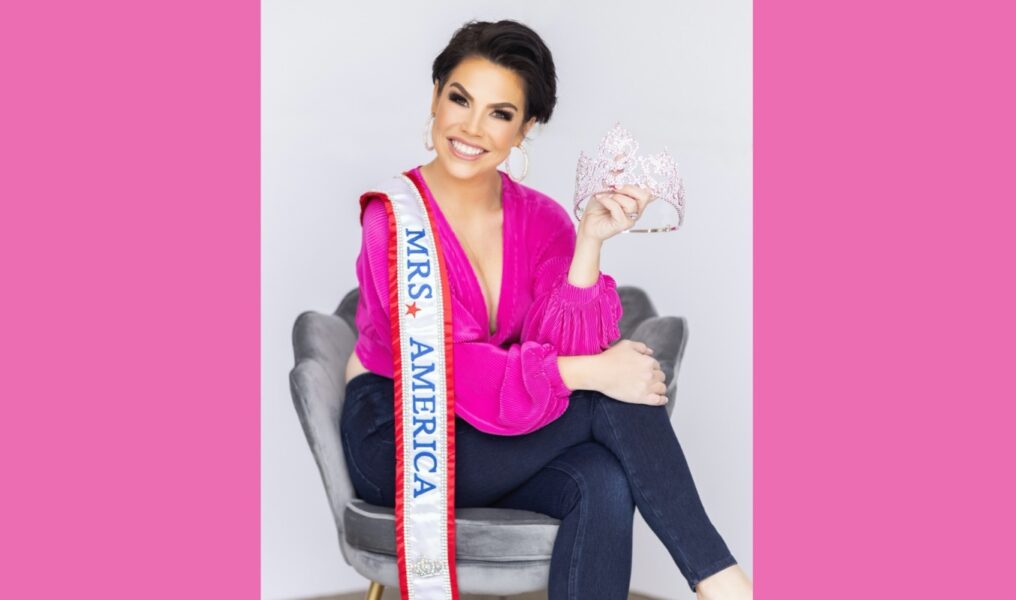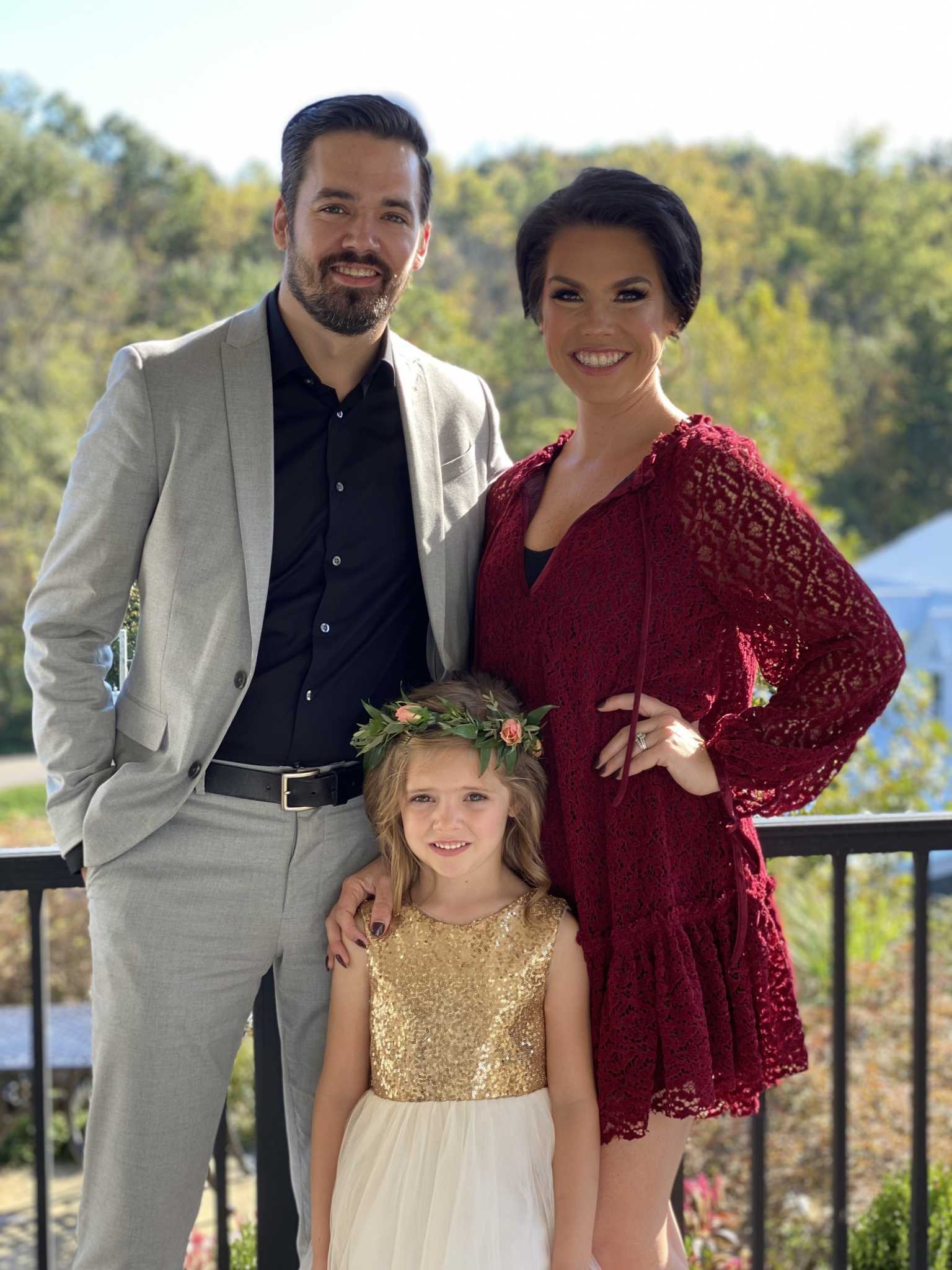The First Mrs. America From Michigan Is Proud to Be Intersex
Intersex pageant winner Jackie Blankenship is on a mission to end cultural taboo around the topic

Whatever outdated notions one has about the world of pageantry, Grand Rapids radio personality Jackie Blankenship is here to upend them. Blankenship, who in November was crowned Mrs. America 2022, counts herself as part of the LGBTQ+ community. And while a few winners of well-known pageants have been openly gay or transgender, Blankenship, as an openly intersex individual, is rare. What’s more, Blankenship is using her platform as the first Mrs. America from Michigan to advocate for intersex youth.
When she was an adolescent, “My friends started having their period and having changes with their bodies,” Blankenship said. “And I was having the same changes. I was developing as a typical female, but I didn't have a period.”
Blankenship has an intersex condition called complete androgen insensitivity syndrome. When she was an infant, doctors discovered Blankenship had been born without a uterus or ovaries; instead, she had internal testes that were producing estrogen. Blankenship said she wasn’t fully aware of this until she reached puberty.
“Because of a lack of knowledge on conditions like mine,” Blankenship said, “doctors urged my parents to have them removed. So when I was only 15, I had a surgery to have both internal testes or gonads removed from my abdomen, and was forced on an artificial hormone — a patch.”
Out of fear, Blankenship said she didn’t ask a lot of questions.
“I was really good about just pretending everything was fine,” Blankenship said. “And I think that I had a knack for convincing myself, ‘Yeah, I just had a hysterectomy and everything's normal.’”
Around this time, Blankenship became interested in pageantry. She recalled being at the mall with her mother where a pageant was taking place. Blankenship, who enjoyed watching pageants on television, with all their fancy dresses and glamor, was enthralled. Her parents aren’t “pageant people,” Blankenship stressed, and her younger sister didn’t understand either.
“I think there was a part of me that had a very important need and urge to be very feminine,” Blankenship explained, “because I was at a … juncture in my life where I was being told by doctors things that made me uncomfortable. It made me feel less feminine and because of that, I had this urge to do this.”
In her 20s, Blankenship took a break from competing in pageants. She attended college on a track and cross-country scholarship and got married. Then Blankenship discovered the world of “Mrs.” pageantry and pageants that are platform-based. However, when she explored the idea of competing with a platform, Blankenship wasn’t yet ready to speak out about being intersex. It wasn’t even until she was 25 or 26 that she fully understood it.
“People can be really cruel and say things — uneducated things — and I emotionally wasn't in a place where I could handle it,” Blankenship said. “If someone said … I wasn't female enough to them, I couldn't take that kind of backlash. I wasn't there yet.” She chose infertility as her platform.
Blankenship’s 5-year-old daughter, Greenleigh, was conceived via in vitro fertilization using Blankenship’s sister as a surrogate with sperm from Blankenship’s husband and donor eggs. Focusing on women’s infertility journeys made sense at first. Blankenship received an outpouring of support from women, yet she said she felt like a fraud.
“I didn't struggle with infertility,” Blankenship said. “I had a different issue. Now, I can't have children because of my issue, but it just felt like a very different animal altogether. And I felt like I was leading people on. Like, ‘Yeah, I understand your journey,’ when really, I don't understand their journey and they definitely don't understand mine.”

Blankenship came out publicly in a 2017 West Michigan Woman blog titled “I Am Intersex and I Am Here.” In it, she explained that because of her condition she has XY chromosomes, which are typically male, but she otherwise developed as female. Blankenship’s condition represents just one of 44 different intersex variations that affect up to 2 percent of the population. The response to her first-person account was tremendous.
“I guess you'd say it kind of blew up in the support I got from the LGBTQ+ community and the community in general here in West Michigan,” Blankenship said. She thought she should talk about it more.
“That's when I started getting messages, not necessarily from other intersex individuals, but from parents who wanted to stay anonymous: their child was just diagnosed with an intersex condition, whether it was mine or a different one, and they didn't know where to turn. And after reading my article, they were freaked out because their doctor had already suggested surgery and their child was only a baby.”
Blankenship supports the work of interACT Advocates, an organization that advocates for the human rights of children born with intersex traits. They believe in putting an end to medically unnecessary, nonconsensual intersex surgeries. They also believe that improving communication is a crucial part of improving care for intersex children.
Now comfortable answering questions from people who know little about the intersex community, Blankenship acknowledges being so outspoken is not for everyone.
“It's up to the individual to come out and talk about that if they ever want to,” Blankenship said. “And if they don't want to, that's fine, too. You should never be forced to talk about your genitals. And that's what a lot of this comes down to.”
“Intersex” refers to an individual born with reproductive or sexual anatomy and/or a chromosome pattern that doesn’t seem to fit typical binary definitions of male or female. That is, Blankenship and others with intersex traits don’t fit in a traditional box when it comes to gender.
Blankenship may be able to “pass” without effort, but said she feels welcome in the LGBTQ+ community just the same. However, Blankenship called it troublesome that because she presents herself with so much femininity — pageantry and all — those who have never met someone who’s intersex might not get the full picture.
“I sometimes worry that I make people who might not necessarily align themselves with the LGBTQ community feel very safe because they see me [and] they say, ‘Oh, well, that's intersex. I'm fine with it,’” Blankenship said. “And sometimes it makes me feel a little heavy, a little sad, because I worry that we need to show more differences. But I'm one of the very few that are willing to talk about it.”

Raised in Portage, Blankenship, 36, now lives in Grandville with her husband, Jimmy Blankenship, and their daughter. Along with Rachel Gray, she’s half of the “Gray and Green Show,” which can be heard mornings on 105.3 HOT FM (Blankenship was born Jackie Green.) She’s proud of its distinction as an all-female show, one that won a Michigan Associations of Broadcasters award for Best Morning Show. When she’s not on air, spending time with family or competing in pageants, Blankenship is also a competitive runner.
Blankenship competed in the Mrs. World pageant last month but didn’t win the title. For her pageantry and her advocacy, Blankenship hears often from young people who look to her as a role model.
“I've really gotten that a lot and it's a very special thing to hear,” Blankenship said. “It makes me feel a lot of overwhelming emotions because when I was 15 and I had that surgery and I felt very alone and I had no one to talk to, I would have loved to have been able to log onto the internet and see someone talking about this [or] to see it in media at all. And you didn't, unless you read some sensationalized book like 'Middlesex.'
“And it's hard because when you don't see yourself ever portrayed, you feel like you're wrong or you're so different that no one can relate to you,” she added.
Eventually Blankenship found a community online, and today she understands herself differently. Intersex is not a disorder. And she didn’t need medical intervention, because her body was fine the way it was.
Blankenship said, "We should look at it as kind of freakin’ magical that our bodies can be born different than what you think you know — and what science has told you — because we've done so little research.”









